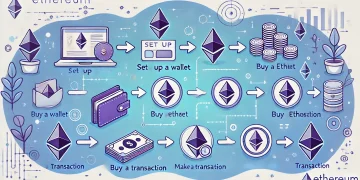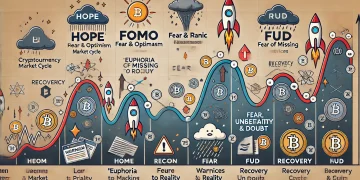The cryptocurrency space can feel overwhelming to new investors. It’s a world filled with specialized jargon and buzzwords that aren’t always easy to grasp. If you’re just starting out, knowing the basics is essential for navigating the industry with confidence. In this guide, we’ll cover 10 key crypto terms every newcomer should understand, helping you build a solid foundation to explore the exciting world of digital currencies.
1. Blockchain
Blockchain is the underlying technology that powers cryptocurrencies like Bitcoin and Ethereum. At its core, a blockchain is a decentralized, digital ledger that records all transactions across a network of computers. Each “block” in the chain contains a set of transactions, and once added, these blocks are virtually tamper-proof.
Unlike traditional banks where information is centralized, blockchain ensures that everyone in the network has access to the same data, making it secure and transparent. This decentralization helps prevent fraud and hacking, making blockchain the backbone of most cryptocurrencies.
- Why it matters: Understanding blockchain will help you grasp how cryptocurrencies achieve security and transparency.
2. Wallet
A crypto wallet is a tool that allows you to store and manage your cryptocurrencies. It can be either hot (connected to the internet) or cold (offline). Wallets store private keys—essentially passwords—that give you access to your assets. Without these keys, you can’t access or spend your crypto.
- Hot wallets: Examples include mobile wallets, web wallets, and exchange wallets, which are convenient but more susceptible to hacking.
- Cold wallets: These include hardware wallets like Ledger and Trezor, which store crypto offline for enhanced security.
- Pro tip: Never share your private keys with anyone to prevent losing your funds.
3. Private Key & Public Key
These are essential components of your crypto wallet. A public key is like an email address that you can share with others to receive cryptocurrency, while a private key is more like a password that gives you access to your funds.
- Private key: This must be kept secret at all times; if someone gains access to it, they can control your wallet.
- Public key: Think of it as your digital address—other users need this to send you funds.
These two keys work together through cryptographic algorithms, ensuring the security of transactions.
4. Decentralization
In the world of cryptocurrency, decentralization refers to the absence of a central authority (like a bank or government) controlling a network. Instead, decision-making power is distributed among network participants, often called nodes.
Bitcoin and other decentralized cryptocurrencies rely on blockchain technology to operate without any centralized oversight. This decentralization ensures that transactions are censorship-resistant, giving users full control over their assets.
- Real-world example: In countries with strict banking rules, people can use decentralized currencies like Bitcoin to store wealth or make payments without government interference.
5. Exchange
A crypto exchange is an online platform where users can buy, sell, and trade cryptocurrencies. Exchanges can either be centralized (CEX) or decentralized (DEX):
- Centralized exchanges (CEX): These include platforms like Binance, Coinbase, and Kraken. They act as intermediaries between buyers and sellers and typically require users to register and verify their identity.
- Decentralized exchanges (DEX): Examples include Uniswap and PancakeSwap. These operate without intermediaries, allowing users to trade directly from their wallets.
- Tip: Start with a trusted CEX if you’re new, as they tend to offer better user support.
6. Smart Contracts
Smart contracts are self-executing agreements coded onto a blockchain. They automatically enforce the terms of a contract once specific conditions are met. Smart contracts remove the need for intermediaries and ensure that transactions are transparent and secure.
Ethereum is the leading platform for creating smart contracts, though other blockchains like Solana and Cardano also support them.
- Example: Imagine a bet between two friends about the outcome of a football game. A smart contract could hold the funds and automatically transfer the winnings to the correct party after the game ends, based on predetermined conditions.
7. Mining and Staking
Cryptocurrencies can be earned or validated in two primary ways: mining and staking.
- Mining: Used in Proof of Work (PoW) systems like Bitcoin. Miners solve complex mathematical puzzles to validate transactions and secure the network, earning rewards in the form of new coins.
- Staking: In Proof of Stake (PoS) systems like Ethereum 2.0, users lock up their coins to help validate transactions and maintain the blockchain. Stakers receive rewards for their participation.
- Key takeaway: Mining requires specialized equipment and significant energy, while staking is more energy-efficient and accessible for most users.
8. Altcoins
Altcoins are any cryptocurrencies other than Bitcoin. Some popular examples include Ethereum, Litecoin, and Ripple (XRP). Many altcoins aim to improve on Bitcoin by offering faster transaction speeds, more privacy features, or smart contract capabilities.
- Fun fact: The term “altcoin” stands for “alternative coin,” signifying that these coins are alternatives to Bitcoin.
- Advice: While Bitcoin is often seen as a store of value, many altcoins have specific use cases, so it’s worth understanding their purpose before investing.
9. Token vs. Coin
The terms token and coin are often used interchangeably but refer to different things in the crypto world.
- Coin: Refers to a cryptocurrency that operates on its own native blockchain, like Bitcoin or Ethereum.
- Token: Represents an asset or utility that exists on another blockchain. For example, ERC-20 tokens like Chainlink and Uniswap operate on the Ethereum blockchain.
Tokens can serve various purposes, such as governance in decentralized projects or access to specific services within a platform.
10. NFT (Non-Fungible Token)
NFTs are digital assets that represent ownership of a unique item or piece of content, such as art, music, or virtual real estate. Unlike cryptocurrencies like Bitcoin, which are fungible (interchangeable with one another), each NFT is one-of-a-kind and cannot be replaced.
- Popular uses: NFTs are commonly used in the art world, gaming, and virtual worlds like the metaverse. Platforms like OpenSea have become hubs for NFT trading.
- Fun fact: Some NFTs have sold for millions of dollars, fueling excitement and skepticism in equal measure.
FAQs about Common Crypto Terms
1. What is the difference between a hot wallet and a cold wallet?
A hot wallet is connected to the internet and offers convenience for frequent transactions, while a cold wallet is stored offline, providing enhanced security from hacking attempts.
2. Can I lose my crypto if I forget my private key?
Yes, losing access to your private key means you lose access to your cryptocurrency. It’s essential to store private keys securely, such as in a password manager or on a piece of paper in a safe place.
3. What’s the purpose of a decentralized exchange (DEX)?
A DEX allows users to trade cryptocurrencies directly from their wallets without the need for a centralized intermediary. This ensures more privacy and control over funds.
4. How does mining differ from staking?
Mining involves solving complex algorithms to validate transactions (used in Bitcoin), while staking locks coins to validate transactions and secure the network (used in Ethereum 2.0 and others).
5. Are NFTs just for art?
While NFTs are most popular in digital art, they also have applications in gaming, music, real estate, and even ticketing systems. They represent ownership of unique digital or physical assets.
6. Is it safe to invest in altcoins?
Investing in altcoins can be profitable but also carries risks. Research each project’s use case, team, and technology before investing, and diversify your portfolio to mitigate risks.
Understanding these 10 common crypto terms will set you on the right path in your journey through the crypto space. As you delve deeper, you’ll encounter even more specialized concepts, but mastering the basics will give you the confidence to participate meaningfully. Whether you’re interested in investing, trading, or just learning about blockchain technology, these terms form the foundation of your knowledge.


























